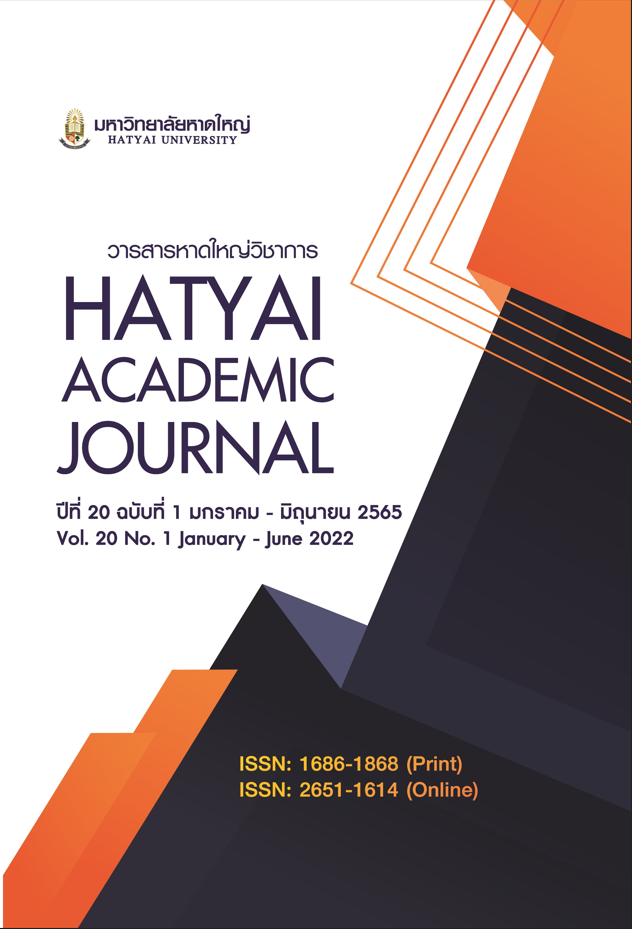Influence of Integrated Reporting on Financial Performance: Evidence from Companies Listed on the Stock Exchange of Thailand
Main Article Content
Abstract
This study aimed 1) to investigate the extent, level, and trend of integrated reporting in the annual reports of companies listed on the Stock Exchange of Thailand from 2016 to 2018, and 2) to test the influence of integrated reporting on the corporate financial performance of the listed companies. The samples were 200 companies listed on the Stock Exchange of Thailand. Descriptive analysis, correlation analysis, and multiple regression were used to analyze the data. The results showed that the level and trend of integrated reporting of Thai listed companies were increasing during the period being studied. The most common issue of integrated reporting was financial capital followed by intellectual capital, social capital, human capital, manufactured capital, and environmental capital. Moreover, there was a positive significant influence on the reporting of manufactured capital, intellectual capital, size of the company, and type of auditor on corporate financial performance. The contribution of this study is to provide information to companies for gaining good financial performance and to investors and other stakeholders for decision-making about the companies listed on the Stock Exchange of Thailand.
Article Details

This work is licensed under a Creative Commons Attribution-NonCommercial-NoDerivatives 4.0 International License.
All published articles are evaluated by three qualified peer reviewers from various institutions through a double-blind process, where reviewers do not know the authors’ identities and authors do not know the reviewers’ identities. The content and articles in the Hatyai Academic Journal reflect the authors’ views only and are neither the opinions of the editorial board nor the responsibility of Hatyai University. The Editorial Board of the Hatyai Academic Journal allows articles to be reproduced for academic purposes, on the condition that the original source is clearly cited.
References
Abdullah, D. F., & Sofian, S. (2012). The relationship between intellectual capital and corporate performance. Procedia-Social and Behavioral Sciences, 40(4), 537-541.
Atalay, M., Anafarta, N., & Sarvan, F. (2013). The relationship between innovation and firm performance: An empirical evidence from Turkish automotive supplier industry. Procedia-Social and Behavioral Sciences, 75(2), 226-235.
Atkins, J., & Maroun, W. (2015). Integrated reporting in South Africa in 2012: Perspectives from South African institutional investors. Meditari Accountancy Research, 23(2), 197-221.
Belsley, D. A., Kuh E., & Welsch, R. E. (1980). Regression diagnostics: Identifying influential data and sources of collinearity. New York: John Wiley & Son.
Churet, C., & Eccles, R. G. (2014). Integrated reporting, quality of management, and financial performance. Journal of Applied Corporate Finance, 26(1), 56-64.
Connelly, J. T., & Limpaphayom, P. (2004). Environmental reporting and firm performance: Evidence from Thailand. The Journal of Corporate Citizenship, 13(1), 137-149.
De Villiers, C., Rinaldi, L., & Unerman, J. (2014). Integrated reporting: Insights, gaps and agenda for future research. Accounting, Auditing & Accountability Journal, 27(7), 1042-1067.
Deegan, C., & Gordon, B. (1996). A study of the environmental disclosure practices of Australian corporations. Accounting and Business Research, 26(3), 187-199.
Frias-Aceituno, J. V., Rodriguez-Ariza, L., & Garcia-Sanchez, I. M. (2014). Explanatory factors of integrated sustainability and financial reporting. Business Strategy and the Environment, 23(1), 56-72.
Gunday, G., Ulusoy, G., Kilic, K., & Alpkan, L. (2011). Effects of innovation types on firm performance. International Journal of Production Economics, 133(2), 662-676.
Higgins, C., Stubbs, W., & Love, T. (2014). Walking the talks: Organizational narratives of integrated reporting. Accounting, Auditing and Accountability, 27(7), 1090-1119.
Ho, L. J., & Taylor, M. E. (2007). An empirical analysis of triple bottom line reporting and its determinates: Evidence from the United State and Japan. Journal of International Financial Management and Accounting, 18(2), 123-150.
Islam, M., & Deegan, C. (2010). Media pressures and corporate disclosure of social responsibility performance information: A study of two global clothing and sports retail companies. Accounting and Business Research, 40(2), 131-148.
Jensen, J. C., & Berg, N. (2012). Determinants of traditional sustainability reporting versus integrated reporting: An institutional approach. Business Strategy and the Environment, 21(5), 299-316.
Kurucz, E. C., Colbert, B. A., & Wheeler, D. (2008). The business case for corporate social responsibility. In A. Crane, D. Matten , A. McWilliams, J. Moon, & D. S. Siegel (Eds.), The Oxford handbook of corporate social responsibility (pp. 83-112). Oxford: Oxford University Press.
Nakao, Y., Amano, A., Matsumura, K., Genba, K., & Nakano, M. (2007). Relationship between environmental performance and financial performance: An empirical analysis of Japanese corporations. Business Strategy and the Environment, 16(2), 106-118.
Rensburg, R., & Botha, E. (2014). Is integrated reporting the silver bullet of financial communication? A stakeholder perspective from South Africa. Public Relation Review, 40(2), 144-152.
Solomon, J., & Maroun, W. (2012). Integrated reporting: The new face of social, ethical and environmental reporting in South Africa? ACCA. London: The Association of Chartered Certified Accountants.
Steyn, M. (2014). Organizational benefits and implementation challenges of mandatory integrated reporting: Perspectives of senior executives at South African listed companies. Sustainability Accounting, Management and Policy Journal, 5(4), 476-503.
Suttipun, M. (2017). The effect of integrated reporting on corporate financial performance: An evidence of Thailand. Corporate Ownership & Control, 15(1), 133-142.
Suttipun, M. (2018). The influence of corporate governance, and sufficiency economy philosophy disclosure on corporate financial performance: Evidence from Thailand. Asia-Pacific Journal of Business Administration, 10(1), 79-99.
Suttipun, M., & Boomlai, A. (2019). The relationship between corporate governance and integrated reporting: Thai evidence. International Journal of Business and Society, 20(1), 348-364.
Tabachnick, B. G., & Fidell, L. S. (2007). Using multivariate statistics (5th ed.). Boston: Pearson/Allyn & Bacon.
The International Integrated Reporting Council (IIRC). (2013). The international integrated reporting framework. London: The International Integrated Reporting Council.
Wright, P., & Ferris, S. (1997). Agency conflict and corporate strategy: The effect of divestment on corporate value. Strategic Management Journal, 18(1), 77-83.


